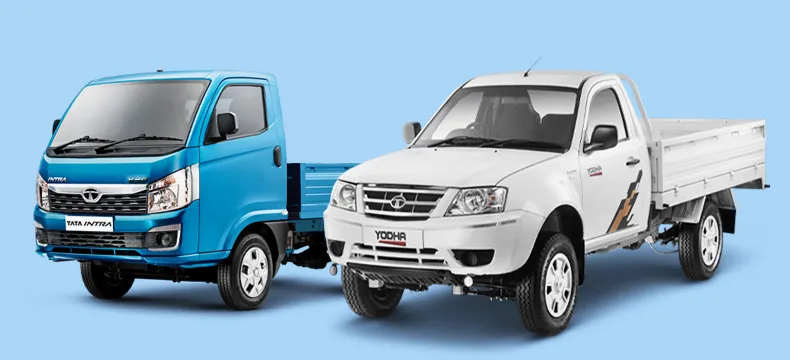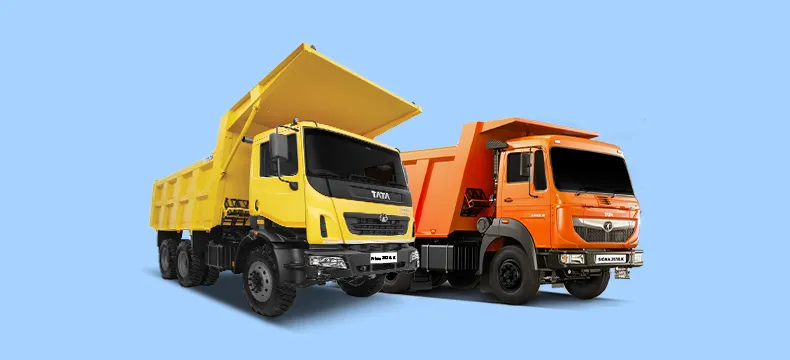29 Dec 2025

Best Small Commercial Vehicles for the Beverage Industry – Guide 2026
- Tata Motors
- 14 Nov 2024
- COMMERCIAL VEHICLE
In the beverages industry, efficient and reliable transportation is crucial for maintaining product quality and timely delivery. Beverage delivery vehicles must be robust, manoeuvrable, and capable of handling varying payloads while ensuring the safety and integrity of the cargo. In this guide, we'll explore the top small commercial vehicles for beverage transportation, focusing on those that offer the best performance, efficiency, and reliability for beverage distribution.
Requirements for Commercial Vehicles in Beverage Distribution
The needs of the beverage industry demand specific features in beverage delivery vehicles to ensure the safe and efficient transport of goods. Here are the key requirements:
-
Optimal Load Capacity and Payload Distribution
-
Manoeuvrability and Compact Design
-
Cooling and Insulation Options
-
Fuel Efficiency and Reliability
-
Safety Features
Top Small Commercial Vehicles Suitable for the Beverage Industry
Here are some of the top commercial vehicles for beverage transportation that meet the unique demands of the beverage industry:
1. Tata Intra V20
The Tata Intra V20 is a versatile small commercial vehicle designed to handle various applications, including beverage distribution:
-
High Payload Capacity
With a payload capacity of 1100 kg, the Tata Intra V20 offers ample space and load-handling capability, making it ideal for carrying heavy beverage crates. -
Powerful Performance
Equipped with a TCIC 4-Stroke, 1.4 CRDI 10 engine, it delivers 70 HP and 140 Nm of torque, ensuring fast turnarounds and high productivity. The engine's performance supports efficient transportation even on hilly terrains, thanks to its 30% gradability. -
Ease of Manoeuvrability
The Intra V20 features electric power-assisted steering, allowing for effortless manoeuvring in urban and congested areas. Its compact size and tight turning radius (4.75 m) make it perfect for city deliveries. -
Sturdy Build and Comfort
With a strong chassis and ergonomic design, the Intra V20 ensures both durability and driver comfort, essential for long hours on the road.
2. Tata Yodha 1500 RHD
The Tata Yodha 1500 RHD is designed for heavy-duty applications and is a robust choice for beverage transportation:
-
Robust Design and High Payload
It offers a payload capacity of 1,250 kg, suitable for transporting a variety of beverages. Its rigid suspension and semi-elliptical leaf springs provide stability, even with unevenly distributed loads. -
Powerful Engine
The vehicle is powered by a TATA 4SPCR10 engine, delivering 85 HP and 250 Nm of torque, allowing it to easily handle heavy loads. The Tata Yodha 1500 RHD is particularly suited for deliveries in rough terrains or rural areas where road conditions may be less than ideal. -
Safety and Reliability
Features like power steering and vacuum-assisted hydraulic brakes ensure safety and control, making the Yodha a reliable choice for beverage delivery.
Future Trends in Small Commercial Vehicles for Beverage Distribution
The future of beverage delivery vehicles is geared towards innovation and efficiency, with trends focusing on:
-
Electrification and Sustainability
Electric small commercial vehicles are gaining popularity as the industry moves towards reducing carbon footprints. These vehicles offer lower operational costs and meet environmental standards, making them attractive options for beverage companies looking to enhance their sustainability. -
Advanced Telematics and Connectivity
Integrating telematics and IoT solutions into vehicles allows for better route optimization, real-time tracking, and predictive maintenance. These technologies help beverage companies improve delivery efficiency and reduce downtime. -
Enhanced Cooling Solutions
Future top small commercial vehicles for beverage transportation may feature advanced cooling solutions, including solar-powered refrigeration units and smart temperature control systems, to ensure that beverages are delivered in perfect condition, regardless of external temperatures.
Conclusion
Choosing the right beverage delivery vehicles is crucial for ensuring efficient, reliable, and cost-effective beverage distribution. Vehicles like the Tata Intra V20, Tata Yodha 1500 RHD, and Tata LPT 810 offer robust solutions tailored to the beverage industry's unique needs. Focusing on payload capacity, manoeuvrability, and advanced safety features, these vehicles provide the perfect blend of performance and reliability.
FAQs
How do I choose between different small commercial vehicles for beverage transportation based on performance and cost-effectiveness?
When selecting beverage delivery vehicles, consider factors such as payload capacity, fuel efficiency, maintenance costs, and suitability for the specific delivery routes. Vehicles with advanced safety features and good manoeuvrability offer better performance and cost-effectiveness.
What are the key features to look for in a small commercial vehicle for the beverage industry?
Key features include adequate payload capacity, compact size for easy manoeuvrability, robust suspension systems for stability, and cooling options if temperature control is necessary. Fuel efficiency and reliability are also critical factors.
- Tags
Latest Blogs



















